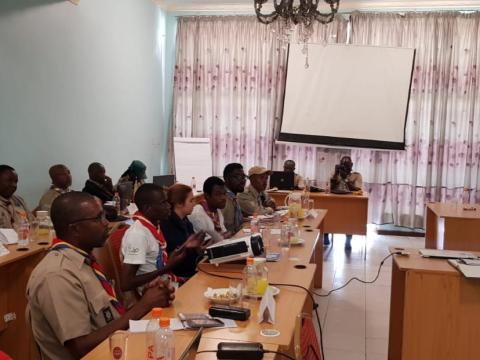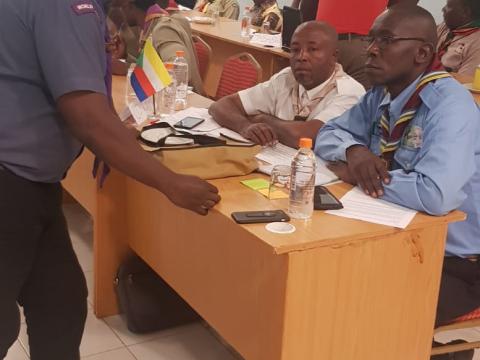Building Scouts’ Capacity for Policy and Action in Emergencies and Humanitarian Settings

The Regional HADI workshop came at an opportune time when the Southern Zone was experiencing a series of disasters from Cyclone Idai to Cyclone Kenneth and the seasonal floods and droughts across different countries. National Scout Organisations are seldom prepared to respond to these natural disasters and even armed conflicts that often result in forced displacement within their borders or to neighbouring countries leading to a humanitarian crisis. The workshop took place in Lilongwe, Malawi from 5th to 9th June 2019, with the overall aim being to encourage national policy development, capacity building and propose implementation tools that can be experimented in humanitarian crises in the African context with a particular focus on creating a safe environment for all and leaving no one behind (diversity and inclusion).
The workshop brought together 20 Scout leaders from 13 National Scout Organisations across the Region, including; Botswana, Central Africa, Comoros, Eswatini, Kenya, Lesotho, Malawi, Mozambique, Namibia, South Africa, Uganda, Zambia and Zimbabwe. As WOSM’s resolution to encourage member organisations to embrace humanitarian challenges, by responding to national and international emergencies and by remaining prepared to respond, it is therefore important to develop and adopt guidelines and programmes that will ensure effective and safe delivery of services to the affected population.
The participants were taken through various areas covering the existing WOSM policies and guidelines on Scouting and Humanitarian Action, Diversity and Inclusion, Safe from Harm, Adults in Scouting and Youth Programme. They were also capacitated to draft national policies and/or Disaster Risk Reduction/Emergency Response Plans, as well as introduction to the WOSM Toolkit on Scouting in Humanitarian Settings. Furthermore, each NSO had the opportunity to draft project proposals to test drive the WOSM implementation tools. One major outcome is that all the 13 NSOs present are able to formulate national policies on the three main focus areas of Scouting and Humanitarian Action, Diversity and Inclusion and Safe from Harm.
Amongst the NSOs, Zimbabwe was one of the countries affected with Cyclone Idai and other frequent floods that occur in the country every other year. “It is important to understand all these policies that we have discussed. More importantly, I appreciate WOSM’s effort to make us proactive on humanitarian action through capacity building and knowledge sharing. I have proposed a set of actions which I will present to the board for approval. I have also been appointed a humanitarian action point person at national level,” stated Mr. Robert Ndlovu - the representative from the Scout Association of Zimbabwe. “The training has given me more insight on how to deal with humanitarian situations. I now know who to contact, how to get support, how to secure our Scouts who are involved in humanitarian action and how to respond and manage a disaster. Also important is how to reach out to refugees, working hard to keep all the Scouts free from harm by coming up with a safe from harm policy in the NSO, including the components of safe from harm in our youth program and giving support in policy making at national level,” said Ajulong Caroline from Uganda.
The team also had the opportunity of visiting Dzaleka Refugee Camp. The camp was established by UNHCR in 1994 for a population of 9,000 asylum seekers in response to a surge of forcibly displaced people fleeing genocide, violence, wars and natural disasters in Burundi, Rwanda, Mozambique and the D.R. Congo. As at the time of our visit, Dzaleka Refugee Camp had around 37,000 people, most of whom are women, children and youths and a clear indicator of congestion. Malawi Scout Association together with the host community uses Scouting as a tool for peace and coexistence for the Refugees from different nationalities. With an amazingly strong unit, Scouting is one of the main activities in the camp that welcomed us with incredible energy and love. The impact of Scouting was clearly evident as everyone joined in dance as Scout songs filled the air. More could be seen during the parade where we met leaders willing to do their best, despite the circumstances, to contribute to the young people’s development. True to the word, Scouting is open to all and is giving opportunity to everyone to be involved; men, women, children, people living with disabilities, different nationalities and races. The works of the Scouts with the Refugees at Dzaleka Refugee Camp gives meaning to why Malawi, is famously known as “the warm heart of Africa”.
